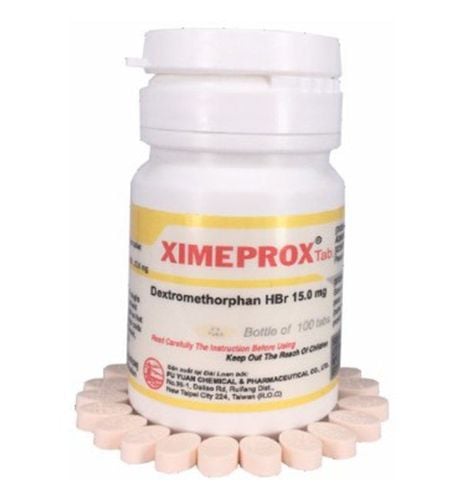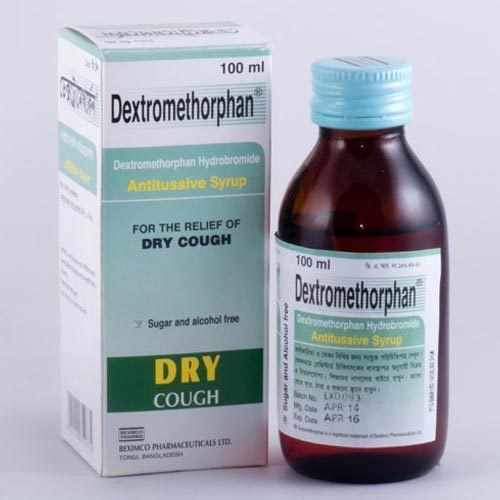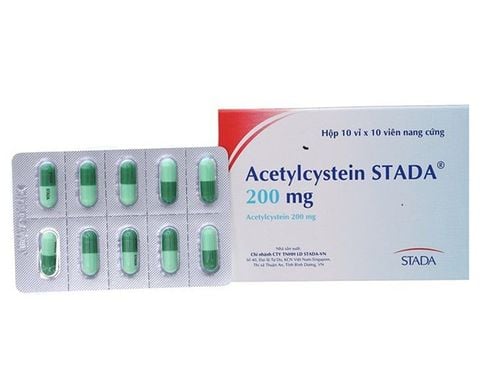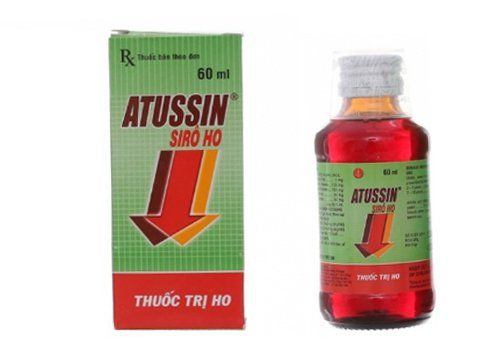This is an automatically translated article.
Dexcon Tablets 10mg is made in the form of tablets, the main ingredient is Dextromethorphan hydrobromide 10mg. Medicines are used in the symptomatic treatment of coughs of various etiologies.1. What are the effects of Dexcon?
Dexcon 10mg medicine has the main ingredient is Dextromethorphan hydrobromide 10mg. Dextromethorphan, a derivative of morphine, is an antitussive agent that acts on the cough center in the medulla oblongata. At therapeutic doses, the dextromethorphan component has no effect on the respiratory center but at high doses can cause depression. Although chemically related to morphine, dextromethorphan has no analgesic properties and very little sedative effect.
Dextromethorphan is often used in combination with other substances in the treatment of symptoms in the upper respiratory tract, does not have an expectorant effect. Dextromethorphan is almost as effective as Codeine, but has less gastrointestinal side effects than Codeine. With therapeutic doses, the antitussive effect of Dextromethorphan lasts 5-6 hours. Although the drug has low toxicity, if used in very high doses, it can cause central nervous system depression.
Indications for use of Dexcon 10mg:
Treatment of coughs due to throat and bronchial irritation stemming from common cold or inhalation of stimulants; Treatment of cough without phlegm, chronic. Contraindications to using Dexcon 10mg:
Patients allergic to Dextromethorphan ingredients; People with respiratory failure or cough due to bronchial asthma; Children under 2 years old; People who are taking non-selective MAOIs (because it can cause severe reactions such as dizziness, high blood pressure, high fever, brain bleeding, even death).
2. Dosage and administration of Dexcon 10mg
Dexcon 10mg is taken orally. Patients at risk of respiratory failure, cough, sputum, and pus should pay attention to the maximum duration of taking Dexcon Tablets 10mg not more than 7 days.
Dosage:
Children from 2 to 6 years old: Take a dose of 5mg/time every 4 hours; Children 6 - 12 years old: Use dose 5 - 10mg / time every 4 hours or 15mg / time every 6 - 8 hours. Note to use up to 60mg/24 hours; Children over 12 years old and adults: Dose 10 - 20mg / time every 4 hours or 30mg / time every 6 - 8 hours. Note maximum use 120mg/24 hours; Elderly: Use the same dose as adults; Children under 2 years old: Do not use the drug. Overdose: When using Dexcon 10mg drug overdose, patients have symptoms of nausea, vomiting, insomnia, agitation, confusion, blurred vision, nystagmus, urticarial rash,... Overdose with large amounts, the patient may have convulsions, coma, respiratory depression. The treatment for overdose is gastric lavage. In case the patient has respiratory failure and central nervous system depression, Naloxone dose 2 - 10mg can be used and support breathing. In the case of patients with convulsions, intravenous benzodiazepines can be used.
3. Side effects of Dexcon Tablets 10mg
When using Dexcon 10mg, patients may experience some side effects such as:
Common: Fatigue, dizziness, nausea, fast heart rate, skin flushing; Uncommon: Urticaria; Rare: Skin rash, occasional mild somnolence, gastrointestinal disturbances, toxicological oddities, central nervous system depression and respiratory depression (if too high a dose is taken). Patients should be informed in advance about the side effects of the drug, such as drowsiness, and the concomitant use of alcohol and CNS depressants should be avoided. When experiencing side effects of Dexcon Tablets 10mg, patients should inform their doctor for appropriate management interventions.
4. Be careful when using Dexcon 10mg
Some notes patients need to remember before and while taking Dexcon Tablets 10mg include:
Cough is often accompanied by sputum because this is a basic reaction to protect the bronchi - lungs. Before taking Dexcon, patients should be carefully checked for other diseases requiring specific treatment, especially bronchiectasis, bronchial asthma, left ventricular failure, endobronchial obstruction, cancer. , pulmonary embolism, bronchopulmonary infections, pleural effusion; If the patient is still coughing after taking Dexcon Tablets 10mg even at the usual dose, the dose should not be increased but should be checked again; Do not use drinks or alcohol when using Dexcon 10mg; In patients with hepatic impairment or elderly, the starting dose of Dexcon should be reduced to 50% and the dose may be increased according to the patient's tolerability and needs; Dextromethorphan use has been associated with histamine release, caution should be exercised when administering the drug to allergic children; Dextromethorphan abuse and dependence can occur (although rare), especially with long-term, high-dose use; There is not enough information on the safety of dextromethorphan use in pregnant women. In late pregnancy, high doses of Dextromethorphan can cause respiratory depression in the newborn. Therefore, the use of Dexcon Tablets 10mg should be avoided in pregnant women; Because there is not enough evidence on the safety of Dextromethorphan, Dexcon 10mg should be avoided in nursing women; Dextromethorphan can cause drowsiness, so caution should be exercised when using it in people who drive or operate machinery.
5. Drug interactions Dexcon Tablets 10mg
Drug interactions can increase adverse effects or affect the effectiveness of one or more drugs. Therefore, before taking the drug, the patient should share with the doctor the list of drugs he is taking, the diseases he is suffering from, etc. At the same time, the patient should not arbitrarily start or stop the drug. , ... without the doctor's permission.
Some drug interactions of Dexcon 10mg include:
Concurrent use of Dextromethorphan with non-selective MAOIs can cause irritation, high fever and cardiovascular collapse; Dextromethorphan should not be used concurrently with alcohol because it will increase the sedative effect of antitussive antitussives; Caution should be exercised when dextromethorphan is co-administered with drugs that depress the central nervous system because these drugs cause increased CNS depressant effects, especially in drivers, operating machinery; Quinidine inhibits cytochrome P450 2D6, which may decrease the hepatic metabolism of dextromethorphan, increase the serum concentration of dextromethorphan and increase its side effects. Therefore, the concomitant use of these two drugs should be avoided. When using Dexcon 10mg, the patient should strictly follow all instructions and instructions of the doctor. Patients should not arbitrarily change the dose of the drug by increasing or decreasing the dose without permission. This ensures the best treatment effect and significantly reduces the risk of unpredictable side effects.
Please dial HOTLINE for more information or register for an appointment HERE. Download MyVinmec app to make appointments faster and to manage your bookings easily.













